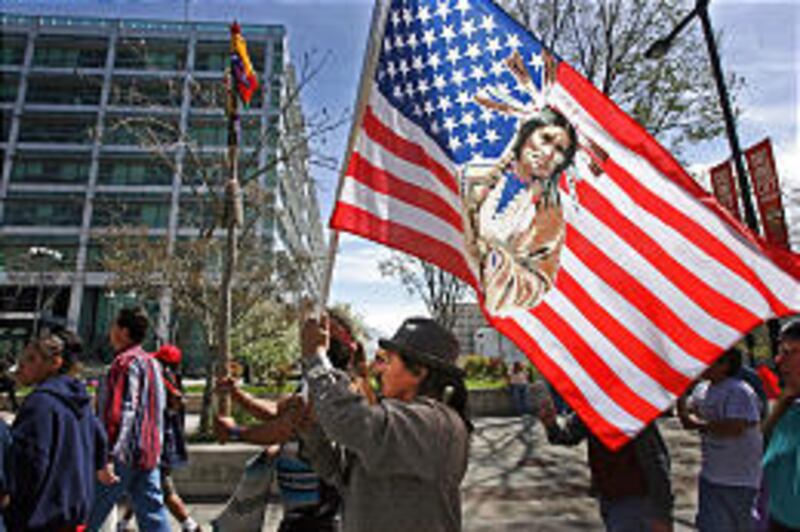Melvin Betsellie carried a dried buffalo skull stuffed with sage as he rallied in support of continued federal funds for walk-in centers that provide free and reduced-cost health care and social services for American Indians.
"We've got to remember our children," said Betsellie, who is Dine, or Navajo, just before taking part in a march and rally.
More than 200 people, mostly Native Americans, marched up State Street to the federal building for a noon rally against a proposed $33 million cut in fiscal year 2007 in federal funding for 34 urban Indian health centers across the country.
The crowd of marchers stretched for a block as a police escort led them about two miles from the start at the Indian Walk-In Center on 1300 South in Salt Lake City. That center could face closure or reduced services if the budget cut is approved.
March organizer Eleanor Iron Lightning said marches are something her people have always done, and that marches make a strong statement.
"We have to start reminding people that promises have been made," Iron Lightning said over a loudspeaker at the rally.
Spokesmen for Sens. Orrin Hatch and Bob Bennett, both R-Utah, took turns at the microphone to read statements by the senators.
Bennett said he will do what he can to restore funding "to a level that will provide for continued service to Native Americans at these facilities."
Hatch said in his statement, "I disagree with the proposal to cut the program." He said it's a federal obligation, as defined by Title V of the Indian Health Care Improvement Act, to provide for urban Indian health care programs.
With the smell of burning sage hanging in the air, Salt Lake County Mayor Peter Corroon took a few minutes at the rally to publicly encourage the federal government to continue supporting Indian walk-in centers.
Salt Lake City Mayor Rocky Anderson spoke for almost 14 minutes at the rally, repeatedly attacking the Bush administration for budget cuts that Anderson said have hurt cities and programs such as the Indian walk-in centers. The mayor's words were often punctuated by cheers from the crowd.
"The United States government has a history of repeatedly violating treaties with Native Americans," Anderson said. What is happening now, he added, is just part of a pattern of betrayal of Native Americans.
"Having gained land from Native Americans in exchange for promises to improve their welfare," Anderson told the crowd, "our federal government has repeatedly and shamelessly reneged on those promises."
An approved budget cut of $33 million would mean the Salt Lake center would lose more than $1.1 million, according to Dena Ned, the center's executive director who is part Chickasaw and Choctaw Indian.
Last year Ned's center served 4,000 American Indians who received more than 7,700 services that included health and dental care, food, emergency assistance and emergency transportation.
"If we weren't here," she asked, "who in this community would pick up that niche?"
Ned, however, is optimistic that the funding for Indian walk-in centers will remain intact, because key decision-makers are starting to understand that there's a federal obligation for continued support.
Just off the marchers' route, Peggy Matlin stood outside of her white Volvo parked in traffic and clapped while waiting for the crowd to cross 200 South along State Street.
"I'm so proud of them," Matlin said. "That takes a lot of courage."
E-mail: sspeckman@desnews.com

